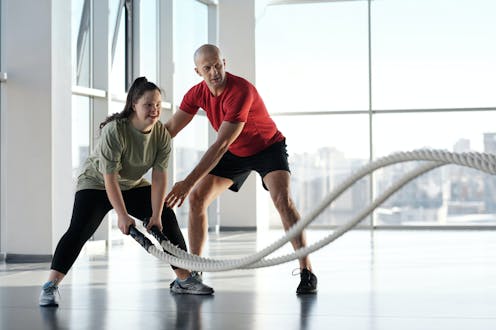How often should you change up your exercise routine?
- Written by Mandy Hagstrom, Senior Lecturer, Exercise Physiology. Director of Teaching and Education, School of Health Sciences, UNSW Sydney

People asking for exercise advice are usually looking for a simple answer. Do this over that. Do this many of that thing, for this long. Get these gains. In reality, things are never that simple.
That’s certainly true for the age old question of how often one should change up one’s exercise routine. Unfortunately, there’s no single, perfectly designed study that answers this question exactly; much depends on things such as how fit you already are, your goals and how you train.
But if you’re thinking about changing your routine, here are some factors to consider.
Read more: Lift heavy or smaller weights with high reps? It all depends on your goal
Progressive overload and diminishing returns
The notion you should mix up your exercise routine likely comes from the concepts of progressive overload (where you need stimulus to get continued improvements) and the principle of diminishing returns (where the more experienced you are at something, the less you progress with a given stimulus).
One way people try to incorporate these principles into training is via something called “periodisation”.
That’s where you manipulate certain aspects of a training program, such as exercise volume, intensity and frequency.
Periodisation models typically keep a consistent exercise selection for a designated period of time, usually an eight to 12 week program.
The two main periodisation models are linear and undulating. Linear periodisation involves gradual increase of a variable. For example, over an eight week program, the loads may get heavier but the amount of sets or reps you do gets lower.
Undulating periodisation involves manipulating different variables (usually volume and intensity) on different days. So, Monday you might do some heavy lifting, then Tuesday’s focus would be on higher repetitions, then have an explosive or speed priority for the next day.
Research shows periodised programs seem to outperform their non-periodised counterparts, with no difference between undulating and linear models.
Even if you aren’t knowingly doing a periodised plan, most exercise programs tend to be eight to 12 weeks long and incorporate some of the standard linear progressions mentioned above.
It depends on your goals
What about mixing up the actual exercises themselves? Research has shown people gain comparative or greater muscle strength and size when they opt for variable exercise selection compared to fixed exercise selection.
Variable exercise selection is where you don’t always stick to using the same exercise for the same muscles groups. For example, you might swap between a squat, and a leg press the next session. Alternatively, fixed selection means for the duration of your program, you stay with the same exercise (say, the squat).
And using a varied selection can improve motivation.
Conversely, excessive rotation of exercises appears to have a negative influence on muscle gains.
When it comes down to it, many movements are skill-based; by not practising as much, you may not progress as fast. This is likely only applicable to complex multi-joint exercises such as those performed with a barbell (as opposed to, say, gym machines).
Does this matter? If you have a performance-related goal to lift a certain amount, or something similar, then maybe it does. But if you are training for health and wellbeing, it may not be a factor for you.
What about running?
Many of us run the same loop, at the same pace, for weeks and years on end. Is that a problem?
Some researchers recommend increasing your training stimulus after six months of endurance exercise, as most of the benefit occurs between three and six months, then tends to plateau without changing training regimes.
But is it enough for health? Our current national physical activity recommendations do not mention the need to progress or vary exercise. They simply state the amount, intensity, and type of exercise for health benefits. Exercising for performance or ongoing improvement seems to be a different story.
If thinking about how frequently we should be changing up our exercise, consider the time it takes for the body to adapt following exercise.
Research has show muscle growth can occur as early as three weeks into a resistance training program and plateaus at approximately three months in previously untrained people.
Adaptations to cardiovascular fitness can occur as early as approximately one week into a training program but have been shown to plateau within three weeks if no additional progressive overload is applied.
Even following a progressive longer term aerobic program, measurements of cardiovascular fitness tend to plateau around nine months into training.
Do what you enjoy and can stick to
So what do we make of all of the evidence above?
Adaptation occurs quickly, but also plateaus quickly without ongoing stimulus.
Even so, we do all have a “ceiling” of adaptation, beyond which it will take significant effort to progress.
This comes back to the principle of diminishing returns, where the more you train, the less able you are to improve.
All things considered, the traditional approach of changing your program every 12 weeks might actually make sense in order to prevent plateaus. However, there is no hard and fast rule about how often you should mix it up.
Perhaps the best approach is to do what you are most likely to stick to and what you enjoy the most.
After all, you can’t get gains if you don’t actually do the work.
Authors: Mandy Hagstrom, Senior Lecturer, Exercise Physiology. Director of Teaching and Education, School of Health Sciences, UNSW Sydney
Read more https://theconversation.com/how-often-should-you-change-up-your-exercise-routine-194905



















